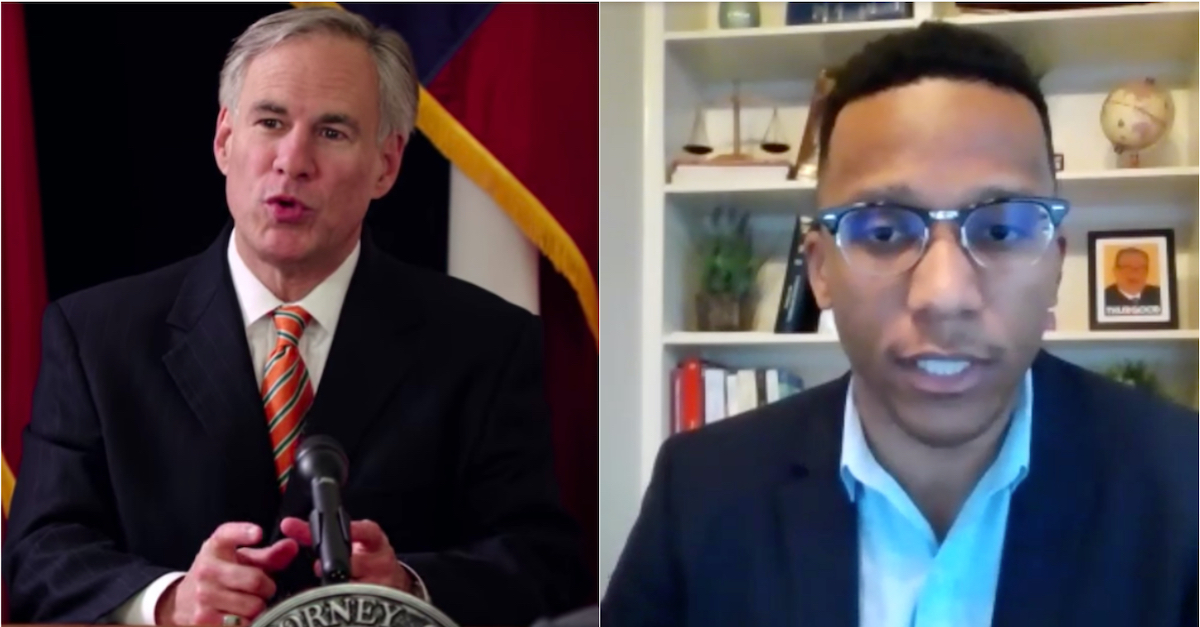
Harris County Attorney Christian Menefee (D), right, sued Texas Gov. Greg Abbott (R), left, over his executive order barring mask mandates.
Texas Gov. Greg Abbott (R) lost his bid to temporarily block the Lone Star State’s largest county and several school districts from enforcing mask mandates meant to keep the coronavirus pandemic under control, the Texas Supreme Court ruled late on Thursday.
The brief ruling upholds a temporary restraining order put in place by a lower court judge last week. Though it may not represent the Texas Supreme Court’s final say on the matter, Harris County Attorney Christian Menefee (D) said he hoped it signaled the high court’s skepticism of Abbott’s controversial decree.
“This is an important decision,” Menefee, the top civil lawyer for Texas’s largest county, wrote in a statement on Thursday evening. “It means Harris County’s orders mandating masks for employees and students stand for now. Our lawsuit against the Governor will continue, and we’ll keep giving all we’ve got to ensure local officials and school districts can protect our students and immunocompromised. I’m hopeful today’s decision also means the Texas Supreme Court is taking a hard look at whether Governor Abbott is misusing the Disaster Act and needs to be reined in.”
On Aug. 13, Menefee filed a scathing lawsuit against Abbott, which depicted the governor’s actions as verging on dictatorial. Abbott’s executive order purports to ban local authorities anywhere in the state from issuing mask mandates, and several school districts joined Menefee’s litigation against the governor.
“The Legislature wrote the Disaster Act to give the Governor powers to effectively mitigate a disaster, but was careful to ensure a Governor could not slyly use a disaster to usurp and consolidate power in his office,” Menefee wrote in a 32-page petition. “The Governor is actively disregarding it and daring the Legislature and the Courts to allow him to convert the cherished limited government of Texas into a dictatorship.”
Menefee filed his petition in Travis County, home to Texas’s capital of Austin. A judge there quickly granted Menefee’s request for a temporary restraining order, while more permanent relief remains under consideration.
In a single-sentence order, the Texas high court unceremoniously rejected Abbott’s appeal of that preliminary ruling.
“Today the Supreme Court of Texas denied the relator’s emergency motion for temporary relief and denied the petition for writ of mandamus in the above-referenced case,” it states.
When the lawsuit was initially filed, Abbott’s press secretary Renae Eze told Law&Crime that the argument that the governor overreached in his powers is “just plain misguided.”
“Under Chapter 418, the Governor has full authority to issue executive orders that have the full force and effect of law in response to a disaster. This health disaster has continued to change, and so should our response,” Eze wrote. “Texans have learned and mastered over the past year the safe practices to protect themselves and their loved ones from COVID, and do not need the government to tell them how to do so.”
This past Tuesday, Abbott—who is fully vaccinated—tested positive for COVID-19, as his administration fought against any local jurisdiction from implementing to prevent the spread of the virus.
Read the ruling below:
(Abbott image via YouTube screengrab; Menefee image via Zoom interview)